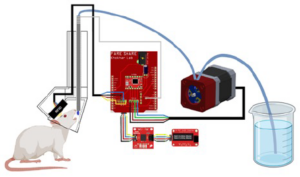FARESHARE: An open-source apparatus for assessing drinking microstructure in socially housed rats
Published in Digital Psychiatry and Neuroscience (2023)
Authors
Jude A. Frie and Jibran Y. Khokhar
Paper presented by Dr. Renata Marchette and selected by the NIDA TDI Paper of the Month Committee
Publication Brief Description
Monitoring drinking behavior in grouped housed animals can provide a more naturalistic setting that can facilitate the investigation of intrinsic and extrinsic factors influencing drinking behavior (e.g. circadian rhythms and social hierarchy). The authors describe an open-source and cost-effective alternative to the limited commercial options. The system can measure both the volume consumed and drinking bouts microstructure in socially housed animals by employing short-range radio frequency identification. It is fully customizable and is compatible with standard housing cages; the Arduino system allows the integration of time-locked, closed-loop interventions, manipulations, and measurements (e.g., fiber photometry recordings, optogenetic stimulation/inhibition). Overall, the authors use step-by-step instructions to a describe a system for monitoring drinking behavior in rodents.
FARESHARE: An open-source apparatus for assessing drinking microstructure in socially housed rats Journal Article
In: NPP—Digital Psychiatry and Neuroscience, vol. 2, no. 1, pp. 1, 0000, ISBN: 2948-1570.

